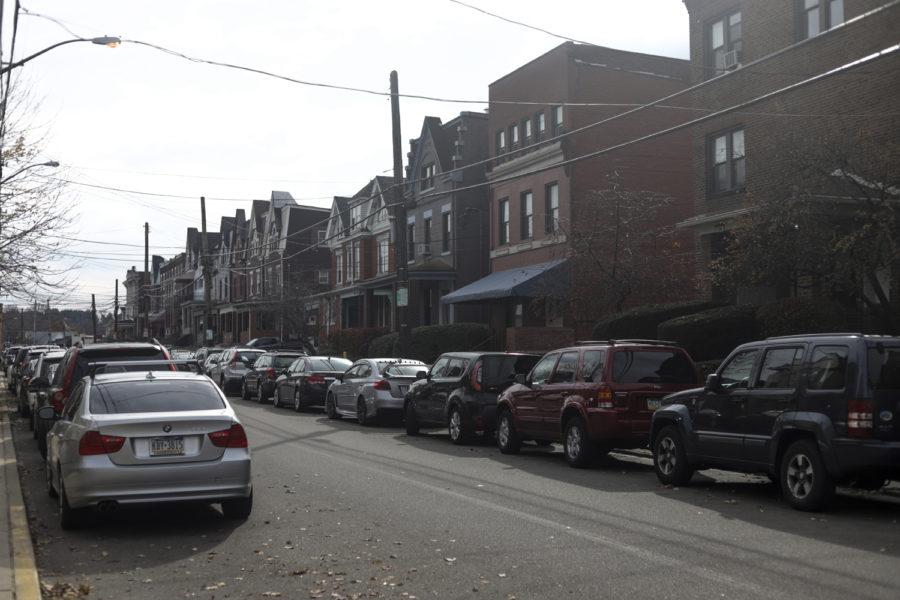Experts advise students on off-campus living, housing contracts and lease responsibilities


The 300 block of Oakland Avenue.
Marily Nixon said she’s “struck” by how many problems arise when students rent property and said it’s worth going through the entirety of the lease before signing it.
“The language can seem very formal and complicated, but it’s worth making your way through [the lease], paragraph by paragraph,” Nixon, a professor at Pitt’s School of Law with expertise in property, said. “It doesn’t matter what the landlord says to you or what you say to them. After you sign, the lease is the agreement between the parties.”
About 58% of students at Pitt live off-campus, and experts say they may run into problems when they don’t understand their rights or the terms of their lease.
In the case of needing external help with their housing situation, students can find resources, such as tenant and landlord mediation, through Allegheny County’s Tenant Resource Guide. On the Allegheny County website, tenants can also file a formal complaint with the county.
Lizabeth Gray, a quality of life consultant for Oakland Planning and Development Center, said students often get into conflicts with their landlord because they don’t understand their lease.
“Students don’t read their leases and or don’t understand what they are agreeing to by signing the lease,” Gray said. “Students need to realize that their responsibilities are also defined in the lease.”
While the terms of the agreement are all laid out for the tenant in the lease, Matthew Feinman, a lawyer in Pennsylvania and legal consultant for the Student Government Board, said student tenants are often unaware of their responsibilities, such as maintaining the rental unit.
“I can safely say I get between one and two students a semester who want to cancel their lease because the landlord didn’t put new light bulbs in the bathroom or didn’t put batteries in the smoke detectors, and my response is ‘too bad,’” Feinman said. “Do it yourself, that’s a tenant’s responsibility.”
In the case that the landlord ignores maintenance issues for longer than two weeks, Feinman said the tenants have two main options. Either the tenants can choose to withhold rent from the landlord, or they can pay to repair the issues themselves and reduce the amount from their rent, effectively reimbursing themselves.
Feinman also recommended that students not renew their lease before winter.
“I see so many contracts that you sign in July to start in August and then you have to renew in November. You haven’t been there for a winter. You don’t know what the winter in the house is going to be like,” Feinman said. “If you can get the landlord to change that to 90 days before the end of the lease, that’s more fair.”
Besides the shared responsibility between the landlord and the tenants, there is also a shared responsibility between the tenants themselves, Feinman said. In most cases, all of the tenants share a common liability for payments and pay rent all together. This means if a single tenant refuses to pay rent, the landlord can sue all of the tenants, even if it’s just one that’s not paying. This principle is assumed automatically in the lease unless stated otherwise, and it is known as joint and several liability, according to Feinman.
Nixon said there could also be important conflicts between a student’s lifestyle and the terms of a lease. She encouraged negotiation between students and landlords in this scenario.
“Leases cover things like whether you can have a pet, smoking, quiet hours, parking and overnight guests,” Nixon said. “Prospective tenants shouldn’t be shy about trying to work with the landlord to revise the document to meet both sides’ needs.”
Gray also said negotiation is a viable option, and said students have the right to “question anything they find in the lease.”
Feinman said landlords often try to take advantage of the ignorance of students, namely, by refusing to return security deposits in full. For example, if tenants paid a $1000 security deposit, landlords can get away with only paying back $600, according to Feinman. Feinman said this is because landlords are not legally required to justify all of the costs that they have in order to keep some of the deposit.
“[Landlords] assume that students will not know tenants’ rights, finding ways to get around the law, or ways that they can talk themselves out of the law,” Feinman said.
Recent Posts
SGB introduces new governing code bill and addresses rumors of ICE on campus
At its weekly meeting at Nordy’s Place on Tuesday, Student Government Board introduced an omnibus…
Opinion | School should be in the summer
Although this may be controversial, I believe that from this data, it is evident that…
Weathering the storm: Pittsburgh teams have tackled some of the toughest environments
The end of the year in western Pennsylvania is always marked by two things —…
Notes From an Average Girl // Notes on Book Banning
In this edition of Notes From an Average Girl, senior staff writer Madeline Milchman writes…
To Be Honest // Yup, it is that damn phone
In this edition of To Be Honest, staff writer Evin Verbrugge writes about her phone…
Meaning at the Movies | Portraying Toxic ‘Adolescence’
In this edition of Meaning at the Movies, staff writer Lauren Deaton explores the mini-series…

